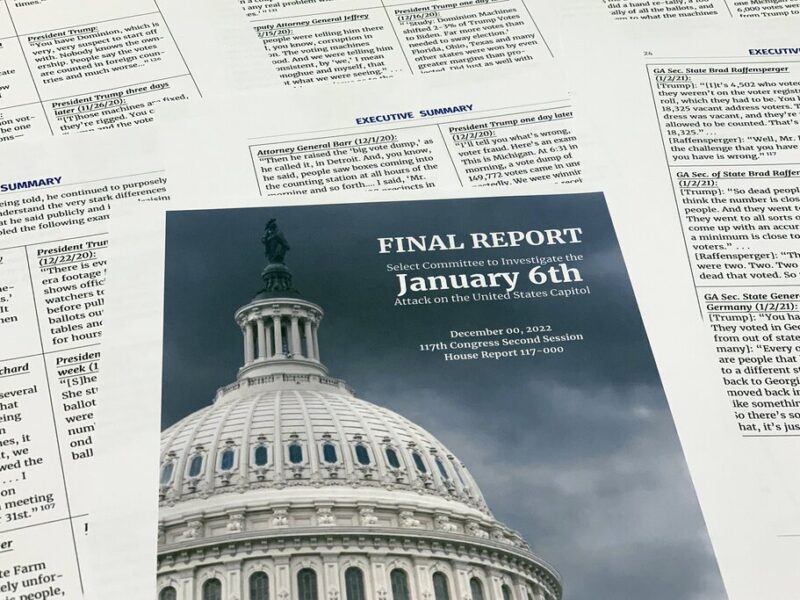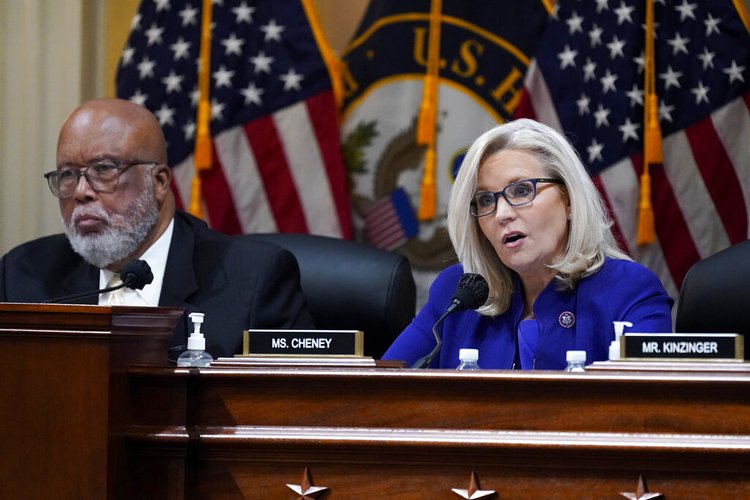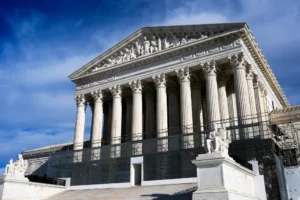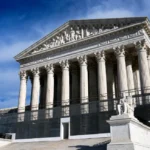Final Jan. 6 Report Focuses on Trump’s Culpability, as GOP Zeroes in on Security Failures
Report serves as a “roadmap” to prosecute Trump as the former president’s legal perils intensify
- Published In: Politics
- Last Updated: Dec 23, 2022

The 845-page report from the select committee investigating the Jan. 6 insurrection places the blame for the violence squarely at the feet of former President Donald Trump. (AP Photo/Jon Elswick)
By Jacob Gardenswartz
Special to the Wyoming Truth
WASHINGTON — Lawmakers on the select committee investigating the Jan. 6 insurrection released on Thursday their final report analyzing the key evidence amassed from their 18 months-long investigation into the attack, just days after members of Congress for the first time in history formally suggested prosecution of a former president on federal criminal charges.
The 845 page document marks the conclusion of the committee’s investigation into the events leading up to, during and after the Capitol riot. It includes details of Trump’s allegedly criminal behavior, an explanation into the methods behind the investigation and a recommendation for steps to be taken to prevent future violence.
“Every President in our history has defended this orderly transfer of authority, except one,” wrote Rep. Liz Cheney (R-Wyo.), the committee’s vice chair, in her foreword. “January 6, 2021 was the first time one American President refused his Constitutional duty to transfer power peacefully to the next.”

One day before the committee released its report, a group of Republican lawmakers led by Rep. Jim Jordan (R-Ohio) released the results of their own investigation into security failures at the Capitol Complex that day, criticizing the select committee’s “Democrat-led investigation,” though two Republicans did participate in the official inquiry.
“The [U.S. Capitol Police] was set up to fail, and there have been scant signs of progress toward addressing these weaknesses,” the Republican report concluded.
Also released by the official committee this week were nearly three-dozen transcripts of interviews with witnesses conducted throughout the course of the investigation, shedding new light on the degree to which several Trump allies sought to undermine the lawmakers’ work. Dozens of witnesses with ties to the former president refused to answer questions by invoking their Fifth Amendment rights against self-incrimination, sometimes dodging questions about matters as straightforward as their own educational backgrounds or their understandings of the structure of American government.
The report’s release caps off yet another precarious week for Trump. On Tuesday, lawmakers voted to release the former president’s 2015-2020 tax returns, which they’d obtained after a years-long legal battle. Though Trump’s full records have yet to be shared, a report from the House Ways and Means Committee showed the IRS failed to audit Trump during the entirety of his presidency despite a policy requiring the audits of sitting presidents and vice presidents.
Criminal referrals increase pressure on prosecutors to charge Trump, allies
Republicans have promised to scale back investigations of Trump when they assume the House majority in January — instead intent to investigate Biden and his family. But the new revelations ramp up pressure on the Department of Justice to pursue charges against Trump—and could buoy his 2024 GOP presidential rivals.
In addition to multiple charges for obstruction and conspiracy, each of which could bring fines and decades of prison time if convicted, lawmakers proposed charging Trump with inciting an insurrection, a crime which brings a unique punishment: barrier from holding public office.
If convicted under 18 U.S.C. § 2383, the criminal statute pertaining to incitement of insurrection, Trump would be “incapable of holding any office under the United States.” Such a conviction would render his 2024 presidential bid moot.
And it’s not just Trump who could be in trouble. In its report, the Jan. 6 committee also suggests prosecution of several Trump allies, including John Eastman, Trump’s election law attorney who authored the controversial memo providing a pretense for then-Vice President Mike Pence to illegally overturn the 2020 election. Lawmakers recommended Eastman be charged with impeding an official proceeding of the U.S. government and conspiring to defraud the U.S.
Panel members also referred four Republican lawmakers to the House Ethics Committee to be sanctioned for refusing to comply with Congressional subpoenas pertaining to their investigation: Rep. Jim Jordan (R-Ohio), Rep. Andy Biggs (R-Ariz.), Rep. Scott Perry, (R-Pa.) and House Minority Leader and potential incoming Speaker Rep. Kevin McCarthy, (R-Calif.).
“Despite the Select Committee’s repeated attempts to obtain information from these Members and the issuance of subpoenas, each has refused to cooperate and failed to comply with a lawfully issued subpoena,” the report states. “The Committee also believes that each of these individuals… should be questioned in a public forum about their advance knowledge of and role in President Trump’s plan to prevent the peaceful transition of power.”
In remarks detailing the criminal referrals on Monday, Rep. Jamie Raskin (R-Md.) noted the report “does not attempt to determine all of the potential participants in this conspiracy” — in other words, the evidence lawmakers send to the DOJ could spur further charges.
In Monday’s meeting, however, lawmakers spent the vast majority of their time focusing on the charges against Trump.
“Ours is not a system of justice where foot soldiers go to jail and the masterminds and ringleaders get a free pass,” Raskin said.
The official report concludes with a series of recommendations to prevent such a subversion of democracy in the future, including the reform of the Electoral Count Act, the 1887 law which Trump relied upon to pressure Pence to overturn the will of the voters.
Language amending that statute to prevent such actions in the future was included in a government spending bill which passed the Senate on Thursday. It is expected to pass the House Friday and be signed into law shortly thereafter.













